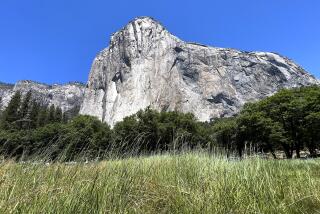Policy Conflicts Over U.S. National Parks
- Share via
Your report (May 24) concerning policy conflicts between Secretary of the Interior Donald P. Hodel and the National Park Service’s director, William P. Mott, is, to say the least, disheartening.
It is apparent that Hodel pays only lip service to the Park Service’s long history of effective management, which has been guided in many ways by the 1872 congressional action that established Yellowstone as the first national park. In part, that act stated, “ . . . the secretary of the Interior . . . shall provide for the preservation, from injury or spoilation, of all timber, mineral deposits, natural curiosities, or wonders within said park, and their retention in their natural condition.” Of note too, President Theodore Roosevelt, commenting on national parks said, “The nation behaves well if it treats the natural resources as assets which it must turn over to the next generation increased and not impaired in value.” It seems to me that through the years, since its establishment in 1916, the National Park Service has provided the nation a quality, multi-purpose program of expansion, development and protective management, thus responding to the natural, historical and recreational needs and values of our growing population and their increased leisure-time opportunities.
Among its comments to the President and Congress, in 1973, the National Parks Centennial Commission recognized the National Park System as a reflection of “The consistency of the service’s professional leadership, expressed through an outstanding and dedicated career service staff, with continuing support of Presidents and Congresses . . . .” That commendation remains just as true today as it did 14 years ago and yet, instead of respecting the service’s expertise, Hodel destroys the morale of this “showcase,” federal service, by implying that staff cannot respond to today’s needs and therefore “outside, professional managers” should be brought in.
Who does he have in mind? More people like his assistant secretary, William Horn, who apparently disregards congressional mandates (or wishes not to understand them), which require the protection of the values and benefits of this superlative, world-renowned, natural, historcial and recreational resource system.
Although Horn’s interest--greater use--is commendable, it appears that the consequences of overuse is of little concern; the term “carrying capacity” escapes his ken or he chooses to ignore it as he attempts to promote an increase in the number of sardines in a can without increasing the size of the can. And, of course, the peace and tranquility of these grand areas, as well as their ecology, are adversely impacted, in some instances, destroyed.
I believe that the National Park Service’s entire staff do effectively strive for the protection of these resources and the quality of the user’s experience, and that our support is necessary and justified, else this and future generations will be the recipients of a degraded, depleted and otherwise damaged National Park System.
To enjoy these immensely popular resources, without precipitating the irrevocable destruction of their fragile, natural values, continues to be the service’s challenge and goal! The solutions are not easy, but they must certainly be found in deliberate visitor limitations and the expansion of the federal, state and local park systems, coordinated with other land and water management programs.
A Hodel or a Horn cannot be allowed to sacrifice the existing National Park System of finite capacity for short-term or commercial gain and long-term loss.
CONRAD R. LICKEL
Los Angeles
Lickel is a retired director of the Pennsylvania State Parks.
More to Read
Sign up for Essential California
The most important California stories and recommendations in your inbox every morning.
You may occasionally receive promotional content from the Los Angeles Times.












